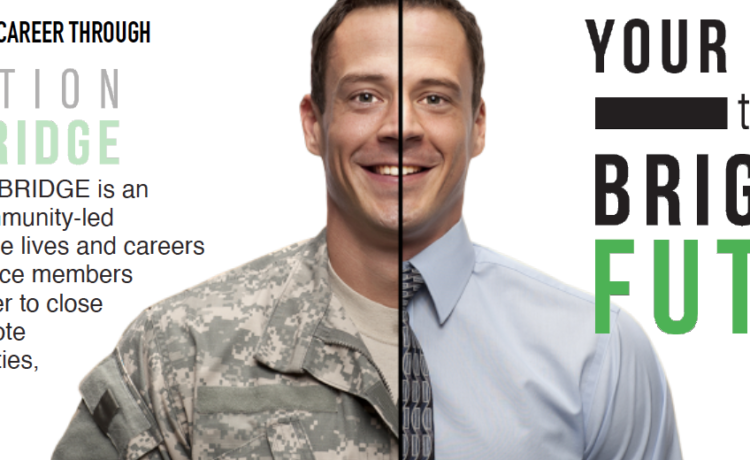Challenge: Bridging the skills gap between the military and civilian life is key to gaining and maintaining employment. Over 80% of the transitioning service members desire to have a complete career change from the occupations held while in the military.
A recent study from the Center for New American Security dated 29 January, 2020 titled: VETERAN PATHWAYS TO EMPLOYMENT: Hurdles and Opportunities, found that while veteran employment rates are currently at historically low levels, post-military personnel are experiencing significant underemployment and having difficulty finding “meaningful employment opportunities.
The study cites a contributing factor to the shaky transition process is attributed to an “ocean of veteran service options,” which ultimately overwhelms applicants and paradoxically complicates the transition process. “There remains a lack of clear pathways from military service to particular jobs—there is no comprehensive roadmap as to which credential, academic degree or job placement program would best help a veteran reach a particular career goal,” the researchers wrote.
The report suggested that instead of creating new employment programs, it would be helpful if resources were consolidated, focused on specific veteran subpopulations that currently do not participate in employment programs, and encouraged interpersonal contact as a preferred method to build professional connections.
In a similar study by DOL VETS titled: VETERANS’ EMPLOYMENT CHALLENGE: Build a better application to match the skills of those who have served in the military with employer needs dated 12/11/2019, the Department of Labor issued a challenge to develop a job matching system that could align veterans skills with their interests. It cites: “Veterans complete their military service with unique and technical skillsets that bring value to all sectors of the economy, but can encounter challenges framing their experience and skills for civilian employers.”
American businesses report that they are also missing an opportunity to attract and retain a capable, competent workforce, and recognize the value in veterans and spouses.
Many job boards, veteran hiring programs, and other initiatives exist, but there are disparate platforms of valuable data. Traversing across these resources can be overwhelming for both first-time jobseeking veterans and businesses with limited time to fill urgent needs. Additionally, most job search tools for
service members are based purely on military occupational specialties, which do not accurately represent the breadth of experiences many individuals have. Finally, small businesses in particular do not have the capacity to build out robust skills profiles that better describe hiring needs.
There is a need for both a more sophisticated matching mechanism and a simpler interface that can pull from existing data sources (from Federal platforms like O*NET, the Credentialing Opportunities On-Line (COOL) program, and the National Labor Exchange, to LinkedIn profiles, resumes, or job descriptions that individuals and businesses have created).
Yet in another study, Genesis10.com cites a “growing skills gap” by 2025, while the shifting division of labor between humans, machines and algorithms may displace 75 million jobs, another 133 million roles may emerge that are more adapted to the new division of labor. That shift looks like this: Today, 71% of total task hours are performed by humans and 29% by machines; by 2022, these averages could shift to 58% task hours by humans and 42% by machines. And the McKinsey Report reports that 50% of today’s jobs are susceptible to AI capabilities (AI will displace 40% of the world’s jobs) thus “The U.S. Is Facing a Critical Skills Shortage, Reskilling Can Be Part of the Solution.”
All evidence points to the need for veteran’s reskilling process like OPERATION SKILLBRIDGE which was designed to address these issues through an integrated four-step process as cited below.
By focusing on and resolving key reintegration issues affecting veterans and the challenges employers face trying to hire them, OPERATION SKILLBRIDGE will orchestrate a predictable talent pipeline from military service to employment in priority job sectors through a joint public private partnership providing coordinated training through multiple agencies.
OPERATION SKILLBRIDGE is an Industry-Driven, Community-Led Initiative to Reboot the Lives and Careers of Transitioning Service Members and Veterans in order to close the skills gap, promote economic opportunities for veterans and their families, and stimulate civic engagement and coordinated access through ongoing community reintegration services.
The goal of OPERATION SKILLBRIDGE is to access their needs 365 days or more prior to separating from service and connect them with matched skills training.
Funding is needed to fund enrollment in the REBOOT Workshop and for staff time to conduct ongoing pre-separation counseling briefs with transitioning service members/veterans before they depart the military to create awareness around different career paths and get them signed up for skills training with community partners.
Background: In 2015, National Veterans Transition Services, Inc. (NVTSI) aka REBOOT, enlarged its vision to include Veteran Workforce Development, working with multiple community partners and employers using NVTSI’s 3-week REBOOT Workshops™ as a foundation to build two additional phases of our veterans’ reintegration model to include industry-related job skills training, and guiding veterans all the way to job placement.
With $25,000 in seed funding from the San Diego Regional Economic Development Corporation to implement a “veteran talent pipeline,” NVTSI developed OPERATION SKILLBRIDGE – An Employer-driven Initiative to Reboot the Lives & Careers of Transitioning Service Members and Veterans and
Promote a Strong Economy.
Solution: By focusing on and resolving the key reintegration issues of veterans and the challenges employers face trying to hire them, OPERATION SKILLBRIDGE will help orchestrate a predictable talent pipeline from military service to employment in priority sectors through a coordinated training effort with multiple agencies.
OPERATION SKILLBRIDGE will serve transitioning service members and veterans with significant barriers to employment such as; disabled veterans, unemployed veterans, homeless veterans, justice involved veterans, low-income veterans, women veterans, and recently separated veterans who have been unemployed for 27 or more weeks in the previous 12 months. Common and significant barriers to employment include but are not limited to the following: lack of knowledge to of how to transfer military skills to civilian jobs/life; lack of job application skills, no post military career plan, not being connected to communities (results in feelings of isolation, depression, anxiety, suicide) Issues from PTSD, TBI, physical disabilities, marriage/divorce, financial problems, homelessness, and other issues.

